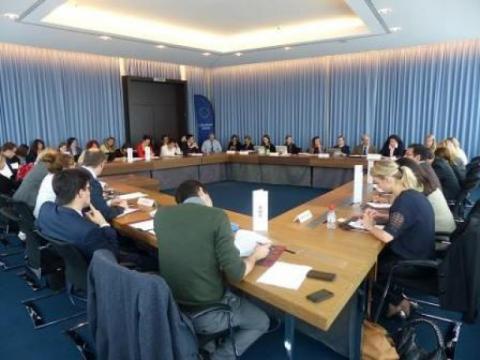
On 8 and 9 October 2014, Alkarama briefed country representatives on its priority recommendations in view of Iraq's Universal Periodic Review (UPR), which will be held in Geneva on 3 November 2014. Alkarama presented the key issues which need to be urgently addressed by Iraq, in particular torture, enforced disappearances, the flaws in the Iraqi judicial system, including the excessive the practice of arbitrary executions, and violations committed in the name of the fight against terrorism – all of which were identified in Alkarama's last report.
Whilst the first meeting was held under the auspices of the EU Delegation in Geneva, the second was organised by UPR Info, a non-governmental organisation (NGO) dedicated to the UPR mechanism's promotion. The other NGOs attending the briefing – amongst which, Minority Rights Group, AUA Americas/UNPO, SAWA Organisation for Human Rights and Al Mesala, discussed issues relating to minorities, women rights and freedom of expression.
Torture and impunity: Iraq should review its legislation and investigate allegations of torture
Despite the prohibition of torture in Iraqi law, Alkarama noted that its definition remained vague and that the penalties – that is, disciplinary sanctions in the case of a law enforcement official – did not appropriately reflect the gravity of the crime. Moreover, many of those who raised the issue of torture in court were never made aware of subsequent investigations into the allegations of torture, or the prosecution of perpetrators. In fact, in most cases, statements made under torture have been admitted as evidence in judicial proceedings. Alkarama also identified the lack of accountability of the security forces as a factor favouring a climate of impunity.
Enforced disappearances: Iraq should end this practice and establish the fate and whereabouts of all those reported missing
Despite Iraq's ratification of the Convention against Enforced Disappearances, Alkarama called upon State Delegations to issue new recommendations calling Iraq to put an end to this systematic practice. Recently, Alkarama submitted numerous cases of enforced disappearances both to the Working Group (WGEID) and the Committee on Enforced Disappearances (CED), noting the lack of willingness from the authorities to cooperate.
Flaws in the judicial system and arbitrary executions: Iraq should ensure the independence of its judiciary and adopt a moratorium on death penalty with a view to abolishing it completely
Alkarama noted that the judiciary in Iraq could not be said to be independent, as it was receiving preoccupying testimonies indicating heavily flawed judicial procedures, violating the inalienable right to a fair trial. Sentences handed down after trials in the absence of legal counsel, relying on testimonies of secret informants or based on confessions extracted under torture, remain frequent. The authorities also continue to allow so-called "confessions" of terrorist suspects to be broadcasted on television, breaching the principle of presumption of innocence. These shortcomings of the Iraqi judiciary are all the more concerning considering the high number of cases of capital punishment carried out or pronounced in the last years.
Violations in the framework of counter-terrorism: Iraq should amend its anti-terrorism law so as to prevent a too broad application of its provisions
Alkarama first noted a preoccupying argument presented by Iraq in its national report, which affirms that the abolition of the death penalty would "constitute a flaw in the criminal justice system, since Iraq is confronted with organised and unorganised heinous and abhorrent terrorist crimes". In this regard, the country's Anti-Terrorism Law stipulates that anyone found guilty of acts of terrorism should be sentenced to death. However, the broad provisions of this law, too often applied in the course of grossly unfair trials, have resulted in a surge of arbitrary executions. Alkarama added that this very law had been used to neutralise opponents of the governments or its policies, and cited the example of former Vice-President, Tariq Al Hashimi who was sentenced to death several times based on testimonies of several of his security officers, who had been subjected to torture and forced to make false confessions.
In conclusion, Alkarama expressed its hope that Iraq will accept the recommendations that will be formulated on 3 November 2014 as tools allowing the authorities to move forwards and to address the current human rights issues in the country.
About the UPR
The Universal Periodic Review (UPR) involves a review of the human rights record of all UN Member States by the Human Rights Council every four years. The reviews take place through an interactive discussion between the State under review and other UN Member States. NGOs can submit information which can be referred to by any of the States taking part in the interactive discussion.
For more information or an interview, please contact the media team at media@alkarama.org (Dir: +41 22 734 1007 Ext: 810)
